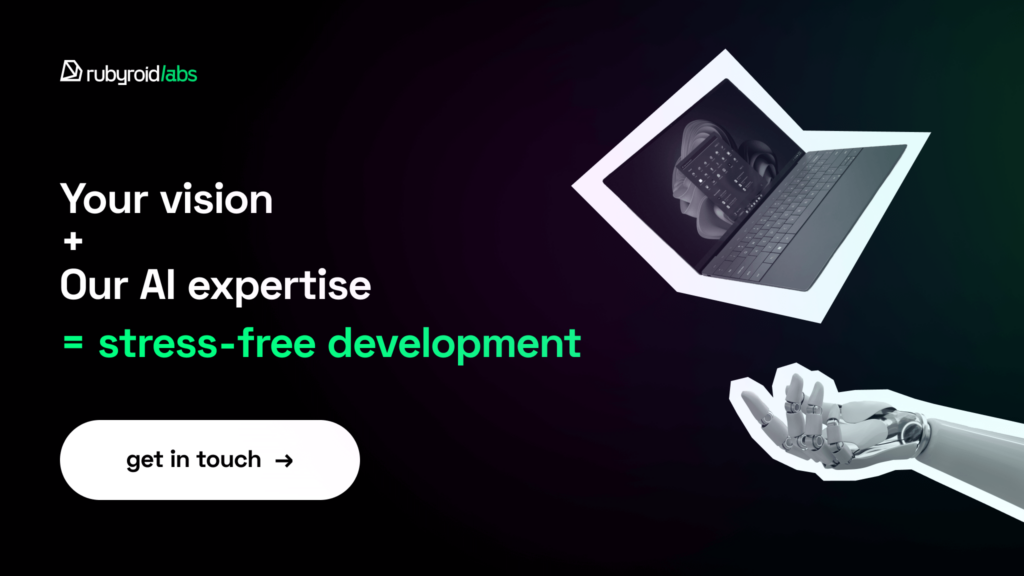AI innovations have been adopted in various segments of the sports industry to improve the speed and quality of both online services and sports events’ organization.
For example, during UEFA Euro 2024, the organizers used advanced virtual perimeter advertising in the stadiums.
With the help of AI and human collaboration, the creators used the LED perimeter stadium advertising boards in a way that allowed sponsors to geo-target the ads. The AI software overlaid the sponsor logos that were broadcast at the moment and adapted them for the digital audience.
So, the stadium spectators saw one set of ads, while the digital audience observed different ads on the boards depending on their location, displayed in their native language.
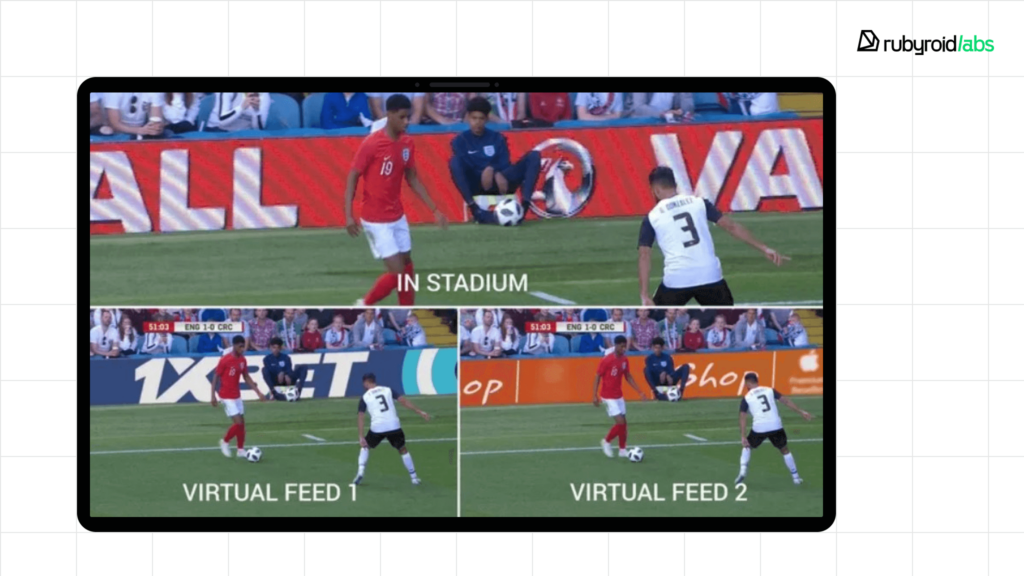
Another example is the wide use of artificial intelligence at the 2024 Olympic Games in Paris, where smart technology has enhanced various aspects such as athletes’ performance, broadcasting, viewer experience, and more.
In this post, we’ll look at examples of how AI has changed the sports industry. Real-world use cases show how AI chatbots may help your project, promote your services, and improve the customer experience.
If you want to integrate Gen AI into your project, get in touch with us. We’ll provide you with an expert view and an estimate for your project.
Contents
- AI Integration During Olympic Games 2024 in Paris
- Gen AI in Sports Media Content Creation
- AI’s Progress in Player Performance, Health, and Capabilities
- The Use of AI Chatbots for Event Management
- AI-based Assistance in Personalized Selection of Sports Equipment
- Empowering Ticketing and Fan Engagement with AI Chatbots
- What’s Next? Trends for Future Use of AI in Sports
- Final Thoughts
We’ll start by taking a deeper look at the use of AI in the 2024 Olympic Games. As the International Olympic Committee (IOC) states, the use of artificial intelligence at the Olympic and Paralympic Games 2024 in Paris will be the biggest showcase of integrating AI into sports events.
AI Integration During Olympic Games 2024 in Paris
“AI Everywhere” is the mission of the IOC to show the world how the latest innovations can help at different levels of the global sports competition. Using the hardware with integrated AI technology by Intel, the organizers expect improvements in at least four spheres:
- Athlete performance tracking: Artificial intelligence will do stroboscopic analysis across several sporting disciplines. This means that spectators will better see athletes’ current movements and biomechanics during the competition. In addition, the system will employ motion tracking to generate data visuals on each athlete’s performance when they enter the water, do aerial exercises, or compete in marathons or canoe sprints.
- Improving broadcasting worldwide: AI-powered hardware by Intel will support broadcasting services to provide a better viewer experience. At the same time, Alibaba, a worldwide Olympic companion, will deliver multiple multi-camera replay systems with built-in AI high-quality restoration in the cloud, as well as generate models in three dimensions and map new views in 21 sports and disciplines.
- Saving athletes from cyber abuse: AI will scan the social media posts, uncover offensive statements, and send notifications to the related platforms in order to apply necessary measures to the authors of the posts.
- Creating highlights videos: AI algorithms will automatically combine the most interesting or significant moments from various sporting events into highlight reels of various durations and formats.
Let’s explore examples of where and how AI chatbots can be used and how you can integrate them into your field, even if it’s not connected to sports.
Gen AI Chatbots in Sports Media Content Creation
Sports journalists need to stay permanently tuned to the latest changes in sports. Gathering, analyzing, and refreshing information manually, apart from writing reports on various sports disciplines, demands a lot of time.
Using a generative AI chatbot is a top solution for dealing with massive amounts of content.
Instead of browsing a team’s results in previous matches or manually analyzing the progress of a team within the tournament, a journalist can ask AI to do these tasks. As a result, they can concentrate on more interesting work like interviewing players, attending key events, or sharing expert opinions.
The AI assistant can handle data-heavy tasks such as:
– creating game summaries
– analyzing the current statistics of sports teams
– predicting the tournament winner
– comparing how a team succeeded historically
Let’s examine an sample of a GenAI chatbot below—“The Six” by WMT.
It’s an automated game recap software based on OpenAI and ChatGPT 4. It can create reports by analyzing the scores and simulating the style and tone of voice of human authors. The journalists can get text material and edit it in a few minutes.
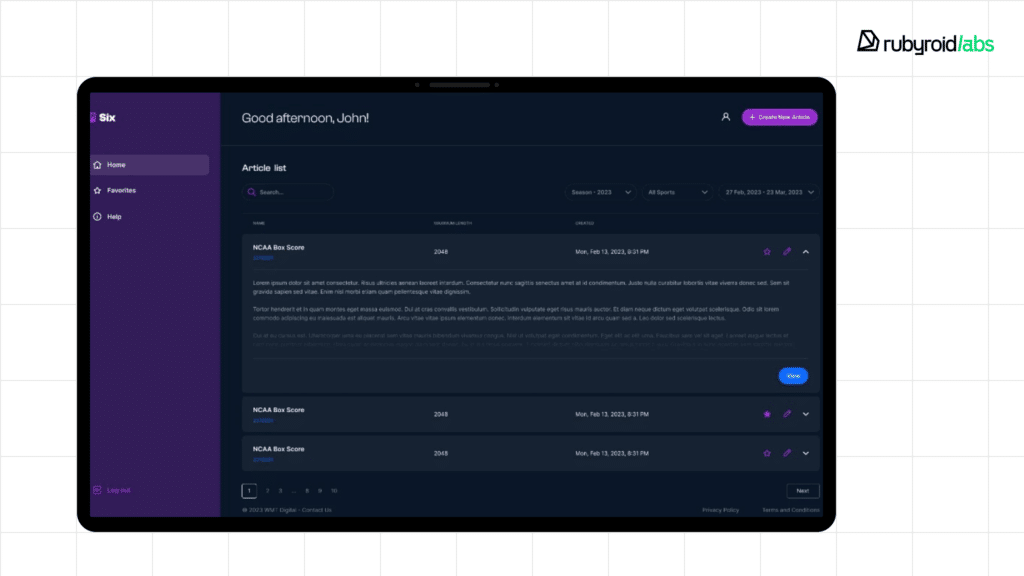
The AI program can keep and analyze up to 10,000 game scores and statistics. It creates special charts, or ‘data graphs’, using information from previous box scores. As a result, a journalist can spend less than 2 minutes reviewing the software-generated data and can produce statistics-focused, story-based, or mixed recaps from it.
AI’s Progress in Player Performance, Health, and Capabilities
Athletes often train too intensively, which frequently leads to overtraining or even injuries. In such cases, they drop out of the training process for rehabilitation, which often takes months. So, an athlete can miss important games or get even depressed due to lost opportunities.
Using a wearable device or sensor attached to the athlete’s body, the coach can monitor the state of the athlete’s muscles and regulate the intensity of training. With the help of GenAI, the coach can get an analysis of the dynamics of the athlete’s body performance and see potential opportunities.
One of the innovative solutions for monitoring athletes’ physical condition is NNOXX. The platform was developed with the participation of the Rubyroid Labs team.
The AI-supported platform of NNOXX includes a wearable sensor, a web application, and a mobile app. It is used to examine the level of oxygenation and nitric oxide in an athlete’s muscles on the spot.
The built-in GenAI collects, studies, and saves individual information from the biosensor during training. Afterward, the AI assistant creates graphics and generates advice on how to make workouts healthier and more productive.
This is a revolutionary solution for the sports segment and has already been adopted across popular US-based sports leagues, like the NBA, MLB, NHL, and NFL, as well as Olympic teams. It is also available on Amazon for fitness enthusiasts.
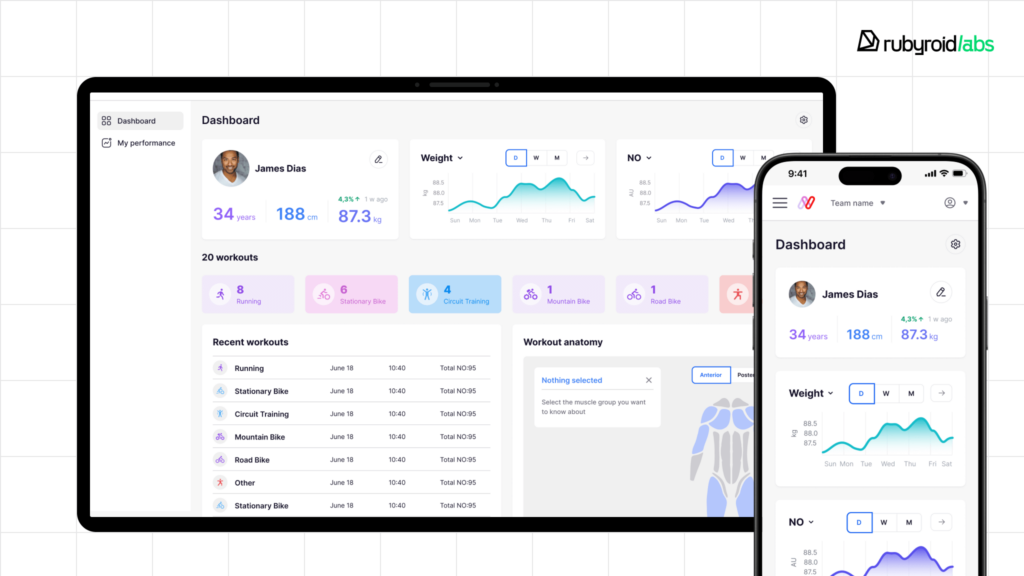
If you need assistance in developing your solution for the sports industry, our developers can share their best practices for integrating an AI chatbot into your project.

The Use of AI Chatbots for Event Management
Chatbots are an excellent tool for providing quick assistance in navigating sports tournaments, supporting the audience, and maintaining a positive atmosphere. Thanks to AI, it’s easier to analyze people’s behavior and improve services according to the audience’s changing needs.
While interacting with an AI assistant, users can quickly get answers to frequently asked questions, find out the latest updates and team scores, and discover interesting historical facts about favorite sports disciplines.
For example, the organizers of the 2024 Olympics in Paris have launched a special platform for the athletes participating in the event, Athlete365.
The web application with an integrated chat bot provides support and important information to the athletes of the Olympic Games. The AI assistant offers personalized content for each athlete, including access to services, courses, articles, advice, and mental health support. The platform serves as a sports community where every athlete can be heard and supported.
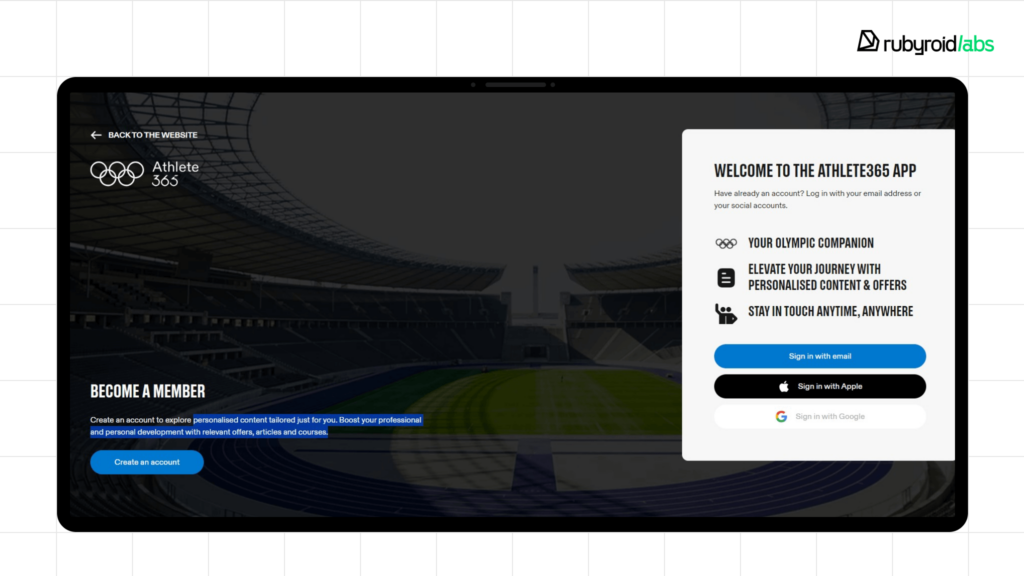
AI-based Assistance in Personalized Selection of Sports Equipment
Hardly anyone remembers the exact criteria for choosing running shoes, a tennis racket, or a road bike.
Now it’s faster and safer to choose sports equipment, thanks to AI technology. Integrated into a platform, an AI chatbot helps find equipment according to the individual parameters of a user. The assistant analyzes body measurements, skill level, playing style, and performance goals and then suggests the most suitable gear for each athlete or enthusiast.
One of the use case examples is an AI assistant for a custom bike fitting and selection app, Myvelofit.
It’s an online platform that offers individualized recommendations through its AI chatbot to help users choose the best-fitting bike. The virtual guide asks questions to uncover as much information as possible about the user’s movements, discomforts, or aches. After a thorough analysis, the user receives personalized recommendations for bike models, component adjustments, and overall fit optimization.
This digital assistant is an excellent solution for online shops selling sports equipment. If you want to integrate such a chatbot into your store or create a new solution for sports-related businesses, we can help you realize your idea.
Let’s discuss how we can integrate AI technology into your website and tailor it to your specific needs.
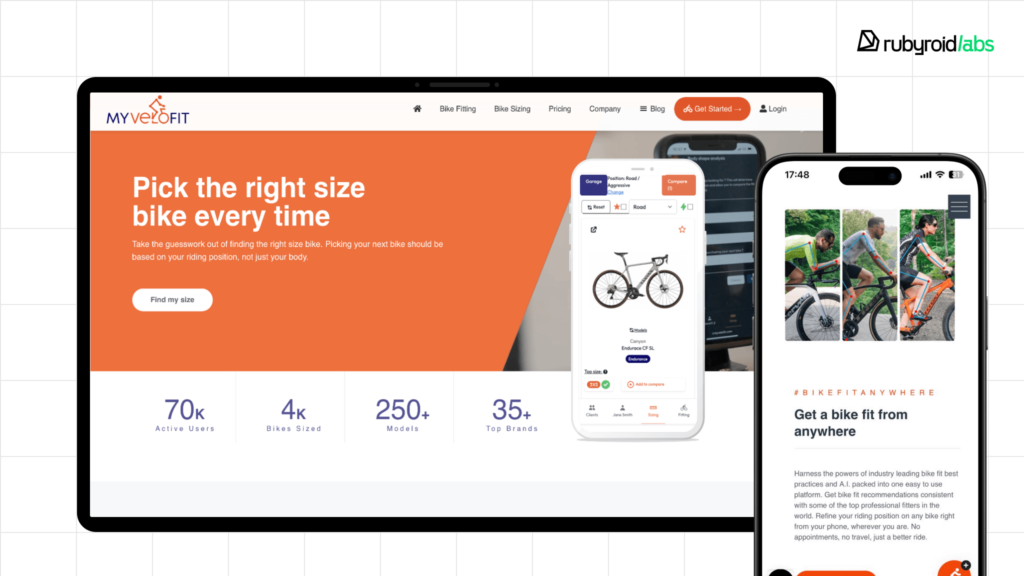
Our development team is now working on app updates and is enhancing the platform.
Empowering Ticketing and Fan Engagement with AI Chatbots
AI chatbots are making it easier and more efficient to sell tickets, engage fans and maintain their interest. Sometimes it takes ages for a person to find and book a ticket, especially if the stadium is huge. A chat bot can help speed up the sell-out of matches and improve the fans’ loyalty and user experience by:
– helping choose faster the best pricing and seats
– guiding people about where to find food or bathrooms on the stadium
– providing updates and predictions about the game
Let’s look at two examples of interactive chatbots—the NHL’s “Puck” chatbot and the NBA’s chatbot on Facebook Messenger.
The NHL’s “Puck” chatbot, also known as PuckGPT, is an innovative AI-driven platform that aims to increase fan interaction and give comprehensive hockey-related information. This chatbot has been educated on an extensive range of hockey expertise, including ticketing, training programs, coaching resources, game regulations, and NHL news.
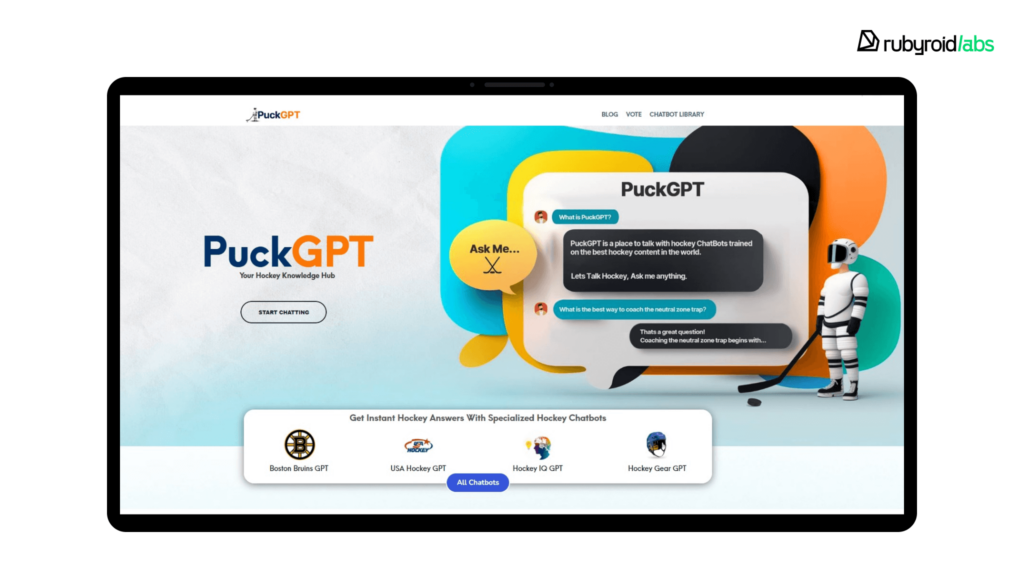
The NBA’s chatbot on Facebook Messenger is an AI-powered chatbot offering quick access to information about the NBA league, such as live scores, player statistics, team standings, and game schedules. Fans can easily access recent news, view highlight videos, and even buy merchandise. The chatbot helps fans follow their favorite teams or players, ensuring that they never miss critical updates or exciting moments.
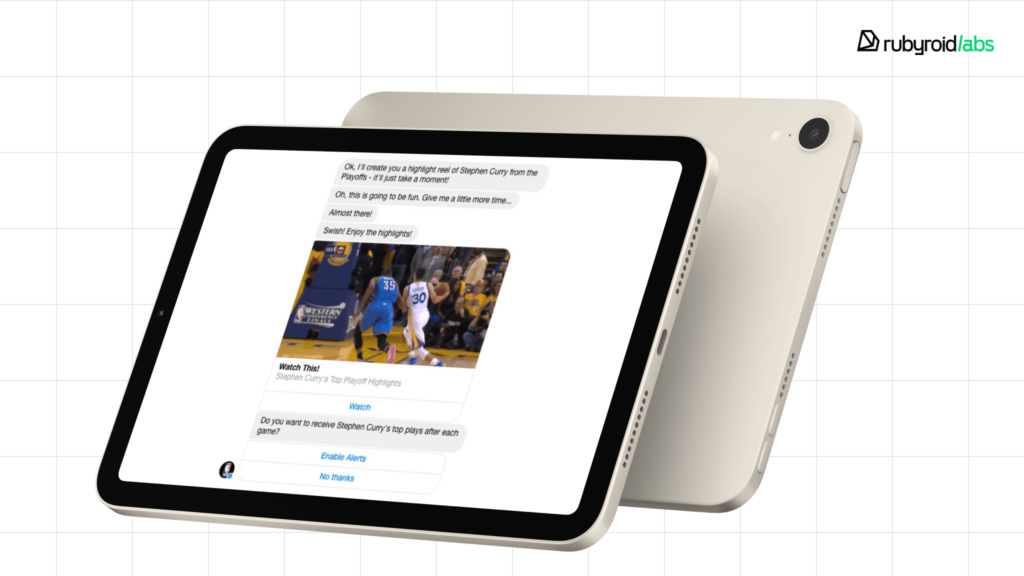
Virtual assistants can engage fans 24/7, requiring only minimal human control.
What’s Next? Trends for Future Use of AI in Sports
Artificial intelligence is growing as a trusted ‘partner’ for humans, especially in the field of sports. It can replace routine tasks, help in monitoring athletes’ physical activity, and assist in working with huge amounts of information.
However, there are other opportunities for AI to advance in sports. We at Rubyroid Labs expect AI to progress in the following areas:
- Predictive Analysis for Team Dynamics
AI will transform team sports by monitoring not just individual player data, but also specific team dynamics. It will forecast the best player combinations, substitution timings, and tactical modifications based on real-time game conditions, opponent actions, and even crowd energy levels. - Immersive Fan Experiences with AI-Enhanced Mixed Reality
We believe that the future of sports watching is in new AI-powered mixed reality experiences. During live games, fans will receive tailored, interactive overlays, with AI delivering real-time information, player insights, and even forecast play outcomes. AI combined with VR and AR will make watching sports more exciting. Fans will feel like they are actually at the game, even if they are watching from home. - Ethical AI and Algorithmic Fairness for Sports Management
As AI progresses in decision-making processes, such as referee assistance and talent scouting, guaranteeing algorithmic fairness will become increasingly important. Advanced AI systems will be created to audit other AI’s choices for bias, ensuring the integrity of sports while capitalizing on technological advances. - AI-Driven, Sustainable Sports Infrastructure
Future smart stadiums will utilize artificial intelligence to minimize energy use, control crowd flow, and even adjust playing surfaces in real time based on weather conditions and player safety parameters.
As technology evolves, we may expect more new applications that will improve the economic side of sports while also enriching the experience for athletes, coaches, and spectators.
Final Thoughts
The potential of AI in sports is huge and evolving all the time. From optimizing athlete performance and injury prevention to revolutionizing fan engagement and content creation, AI is set to transform the sports industry in unprecedented ways.
Together with smart assistants, it’s real to significantly improve many aspects of sports events and enhance services for professional athletes and sports enthusiasts.
By implementing generative AI into your application, you can reach new heights in your business—embracing a wider audience, creating higher-quality content, and offering more personalized experiences.
Reach out to us, and Rubyroid Labs’ development team to realize your project and implement our best expertise in AI integration.
